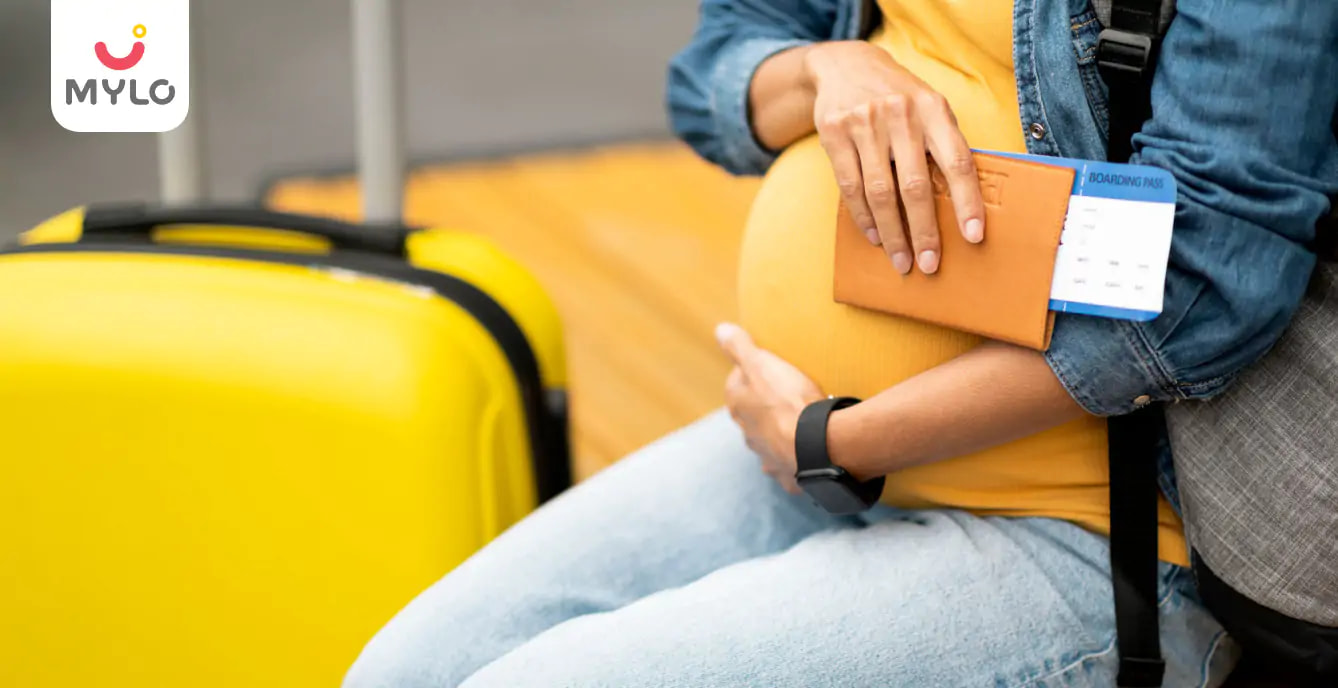Home

Travel & Holidays

Is It Safe To Travel In The First Trimester Of Your Pregnancy?
In this Article

Travel & Holidays
Is It Safe To Travel In The First Trimester Of Your Pregnancy?
Updated on 3 November 2023
This is the most common concern among many pregnant women. With the proper precautions, it is suggested by doctors that most women can travel safely well into their pregnancy. Make sure you have your medical records with you all the time in case of emergencies. Being pregnant does not imply you have to be stuck at home. There are ways you can stay safe and healthy when traveling during pregnancy, whether you are going on a vacation or a business trip.
Is It Safe To Travel In Your First Trimester Of Pregnancy?
The answer is yes. As long as you feel healthy, you can choose to travel in the first trimester of your pregnancy. There are still important considerations when planning a trip during your pregnancy. In the majority of cases, it is safe to travel during the first trimester of pregnancy. The risk of miscarriage is higher in the first trimester of pregnancy, but this elevated risk prevails even without travel. If you don't have any complications, it is safe to travel as long as you feel well.
If you are nauseous or have low energy, you might choose to avoid travel during the early months of pregnancy. It is common to feel tired and have morning sickness which can make travel unpleasant, during this phase of pregnancy.
Normally, the safest and the best time to travel is between 14 and 28 weeks of pregnancy. The risk associated with pregnancy during this period is considerably low since your morning sickness might have subsided, your belly isn't so big and uncomfortable yet and you still have enough energy to move around.
Here are some things to consider to ensure you have a safe journey:
- Your pregnancy stage when the trip is planned
- During the pregnancy, if there have been any complications
- The mode of travel being considered during pregnancy; car, bus, train, or plane
- The distance you need to travel to reach the destination
- Make sure you have coverage for your planned trip that is travel insurance
When Can You Not Travel During Pregnancy?
There are some specific symptoms, conditions, and circumstances during which the risk of travel during the pregnancy increases which must be considered. Some of them include:
- Vaginal spotting
- A previous miscarriage or ectopic pregnancy
- Heart condition or congestive heart failure
- Prior preterm labor
- A pregnancy with multiple babies
- Severe anemia
- Feeling very sick and tired
- A live vaccine requirement, which is unsafe during pregnancy
- Trio to destinations with the virus infection
It's important to talk to your doctor about your travel plans before booking a vacation during your first trimester. They can help to decide if travel is a sensible choice and arrange to get the mandatory vaccines that are safe to take during pregnancy.
Tips For Flying During Early Pregnancy
If your pregnancy is healthy, it is usually safe to fly. However, the following tips might help:
1. Get a health checkup before you go
Those with high-risk pregnancy conditions such as hypertension, sickle cell disease, history of premature labor, and placental abnormalities are not recommended to travel. Also, pregnant women with pre-existing heart conditions should consult their doctor before flying.
2. Move around
The most common concern for all air passengers is the formation of blood clots or thrombosis, especially during long flights. Pregnant women traveling should take special precautions to minimize risks. They are recommended to move their legs and take a stroll up the cabin every once in a while and also suggested to wear support stockings by the doctor.
3. Book a comfortable seat
Book an aisle seat since it is easier to get up frequently for restroom trips or walking through the cabin. The bulkhead seats located right behind a dividing wall between cabins have the most legroom space. Try choosing a seat over a wing, if you are concerned about a bumpy ride. It will give you the smoothest flight.
4. Buckle up
Buckle your seatbelt low on the hips and under the belly so that when severe turbulence occurs, it does not cause an injury. Therefore, it is wise to buckle up and remain seated throughout the entire flight.
5. Stay hydrated
The aircraft cabin has low humidity, which can cause anyone to have a dry nose and throat. To avoid dehydration, make sure to drink water throughout the flight.
6. Prevent air sickness
Morning sickness and fatigue commonly occur when you are pregnant. Ask your doctor for tips to help with nausea, and inquire about any medications required, just in case.
7. Don't consume gas-producing food
Try avoiding food and drinks that produce gas such as beams, carbonated beverages, and cruciferous vegetables before or during the flight. Since entrapped gas expands at higher altitudes leading to a stomach ache.
8. Prepare for digestion problems
Consult your doctor regarding diarrhea medications or remedies that are safe to use during pregnancy.
9. Update your vaccinations
If you are traveling internationally, you may be required to be vaccinated against certain diseases. Many airlines provide a medication guide that covers travel-related diseases you can be inoculated against from food-borne illnesses to influenza.
10. Plan ahead
Before planning a trip, consult your doctor since you may need to pre-book a prenatal appointment at your destination. Purchase travel insurance and educate yourself on hospitals located near where you will be staying.
11. Check on travel advisories
Before traveling anywhere, it is worth checking for any travel or health advisories that could pose a risk for pregnant travelers. The airline website compiles up-to-date data on travel health advisories as well as other safety information. You can look up your destination and check to make sure there are risks and health alerts.
Avoid traveling after 33 weeks of pregnancy for women who have risk factors such as premature labor.
Tips To Travel In a Car During Pregnancy
If you are traveling by car while pregnant, follow these tips:
- Fasten your seat belt under your bump.
- Take frequent breaks to stretch your legs and visit the washroom
- Avoid wearing the belt across your bump as a sudden jolt could cause the placenta to separate from the uterus.
- If you are sitting in the front passenger seat, push your seat back from the dashboard to reduce airbag impact in case of a collision.
- If you are driving, push your seat back from the steering wheel as possible, while still being able to drive safely and comfortably. It may help to tilt the steering wheel downwards, away from your belly.
- See your doctor if you are involved in a collision, however minor.
- Try not to drive for long hours. Try to break your trip into several days with shorter drive times each day.
What To Watch For During Travel While Pregnant?
If you are planning to travel during your first trimester, you wi want to monitor how you feel and check for any signs of complications, including:
- Vomiting and diarrhea that does not stop.
- Vaginal bleeding
- Passing blood clots
- Having contractions
- Stomach pain or cramps
- Severe headache and vision problems
- Water breaking
- Dehydration
It is essential to be careful about your food and water intake to avoid any food-borne diseases or travel sickness. Drink bottles of water without ice cubes and consume only well-cooked foods. Eat fruits and vegetables that are peeled or can be peeled.
Traveling By Sea During Pregnancy
The movement of the boat may accelerate any morning sickness or may make you feel nauseous all over again. However, traveling by sea is generally safe for pregnant women. However, here are some tips:
- Ensure that there is a healthcare provider on board the cruise line, in case there are any pregnancy complications.
- Make certain any medications for seasickness are approved for pregnant women and there is no risk to the baby.
- Review the route to know if there is access to any medical facilities if needed.
- Seasickness bands are a good alternative to medication which uses acupressure points to help prevent stomach upset.
Travel Tips During Pregnancy
Whether you are traveling by car, bus or train, it is generally safe to travel while you are pregnant. However, here are some things too important things to consider:
- It is necessary to buckle up every time you ride in a car. For the best protection of you and your baby, make sure you use both the lap and shoulder belts.
- Remember to turn the airbags on. The safety advantages of the airbag outweigh any potential risk to you and your baby.
- Buses are the most challenging mode of transportation since they tend to have narrow aisles and small restrooms. It is safe to remain seated while the bus is moving. Make sure to hold on to the rail or seat to keep your balance, if you must use the restroom.
- The train is safe and has more room to navigate and walk, but it usually has a small restroom.
- Try to limit the amount of time you are enclosed in the car, bus, flight, or train. Limit travel time to around five to six hours.
- Do take short walks and stretches while taking rest stops to keep the blood circulating.
- Dress comfortably in loose cotton clothes and wear comfortable shoes.
- Carry snack foods with you and enjoy the trip.
- Make sure to carry a copy of the medical records, if you are traveling a distance.
Can Travelling During Pregnancy Lead To Miscarriage?
It is safe to travel during pregnancy unless your doctor suggests otherwise. A complicated pregnancy can be risky, otherwise, it is perfectly safe to travel. Baby is protected inside the womb and gravity cannot affect it. The hormone progesterone maintains the pregnancy safe inside the uterus and tightens the mouth of the uterus. Simple jerks, climbing stairs, traveling, and driving does not affect pregnancy. However, there are some reasons behind abortions early in pregnancy.
- Hormonal deficiency
- Chromosomal abnormality
- An embryonic pregnancy
- Some infections
- Accident or direct blow or trauma on the abdomen
- In some cases, the mouth of the uterus is weak which is called cervical incompetence. This can cause abortion.
- Urinary and vaginal infections can also lead to abortion in early pregnancy, if not treated on time.
Making Yourself More Comfortable
When you are traveling during pregnancy, there are many ways to make you feel more comfortable, most of which resolve the tiredness and sickness that you may have in the first trimester. To help:
- Have small meals often
- Consume healthy foods like bananas and whole-wheat bread
- Drink plenty of fluids
- Suck on stomach soothing peppermint
- To soothe your tummy have some peppermint tea
- Wear loose and comfortable cotton clothes
- Wear acupressure wristbands
- Munch on crackers and stay cool
- Take regular naps in small intervals
- Be careful in the sun
- Get a good sleep every night
Travel Vaccinations When You Are Pregnant
Most vaccines are made up of bacteria or viruses which are not recommended during pregnancy because of concerns that they could harm the baby in the womb. If the risk of the infection outweighs the risk of live infection, some live travel vaccines can be considered during pregnancy. However, it is better to consult your doctor about specific travel vaccinations. If you are pregnant, it is not recommended to travel to parts of the world infected by the Zika virus. This virus is mostly spread by mosquito bites. It is mild and not harmful but can cause some problems in pregnant women. If you are infected by this virus, it can pass on to the baby.
Summary
Traveling while you are pregnant is considered safe. However, if you have medical complications the doctor must suggest otherwise. Traveling during the second trimester is the safest time to travel according to many doctors. Also, avoid traveling to developing nations during pregnancy. Whether you travel by train, car or plane consider your safety first. Always wear loose cotton clothes with comfortable shoes. Carry food and water along and stay hydrated. Follow nutrition guidelines and avoid street food and do not consume raw vegetables and fruits. If you are traveling by car or plane, always fasten the seat belt under the belly. Take all your medications as prescribed by the doctor. Most women travel safely during pregnancy with proper precautions such as travel insurance.
References
1. Walentiny C. (2009). Schwangerschaft und Reisen [Pregnancy and traveling]. Dtsch Med Wochenschr.
2. Kanhutu K, Torda A. (2011). Travel and pregnancy: an infectious diseases perspective. Obstet Med.



Written by
khushboo jain
Get baby's diet chart, and growth tips

Related Articles
Related Questions
Influenza and boostrix injection kisiko laga hai kya 8 month pregnancy me and q lagta hai ye plz reply me

Hai.... My last period was in feb 24. I tested in 40 th day morning 3:30 .. That is faint line .. I conculed mylo thz app also.... And I asked tha dr wait for 3 to 5 days ... Im also waiting ... Then I test today 4:15 test is sooooo faint ... And I feel in ma body no pregnancy symptoms. What can I do .

Baby kicks KB Marta hai Plz tell mi

PCOD kya hota hai

How to detect pcos

Related Topics
RECENTLY PUBLISHED ARTICLES
our most recent articles

Diet & Nutrition
গর্ভাবস্থায় আলুবোখরা: উপকারিতা ও ঝুঁকি | Prunes During Pregnancy: Benefits & Risks in Bengali

Diet & Nutrition
গর্ভাবস্থায় হিং | ঝুঁকি, সুবিধা এবং অন্যান্য চিকিৎসা | Hing During Pregnancy | Risks, Benefits & Other Treatments in Bengali

Women Specific Issues
স্তনের উপর সাদা দাগ: লক্ষণ, কারণ এবং চিকিৎসা | White Spots on Nipple: Causes, Symptoms, and Treatments in Bengali

Diet & Nutrition
গর্ভাবস্থায় পোহা: উপকারিতা, ধরণ এবং রেসিপি | Poha During Pregnancy: Benefits, Types & Recipes in Bengali

Diet & Nutrition
গর্ভাবস্থায় মাছ: উপকারিতা এবং ঝুঁকি | Fish In Pregnancy: Benefits and Risks in Bengali

Diet & Nutrition
গর্ভাবস্থায় রেড ওয়াইন: পার্শ্ব প্রতিক্রিয়া এবং নির্দেশিকা | Red Wine During Pregnancy: Side Effects & Guidelines in Bengali
- ইনার থাই চ্যাফিং: কারণ, উপসর্গ এবং চিকিৎসা | Inner Thigh Chafing: Causes, Symptoms & Treatment in Bengali
- গর্ভাবস্থায় ব্রাউন রাইস: উপকারিতা ও সতর্কতা | Brown Rice During Pregnancy: Benefits & Precautions in Bengali
- Velamentous Cord Insertion - Precautions, Results & Safety
- Unlock the Secret to Flawless Skin: 7 Must-Have Qualities in a Face Serum
- Unlock the Secret to Radiant Skin: How Vitamin C Serum Can Transform Your Complexion
- Gender No Bar: 10 Reasons Why Everyone Needs a Body Lotion
- Unlock the Secret to Radiant Skin How to Choose the Perfect Body Lotion for Your Skin Type
- Top 10 Reasons to Apply a Body Lotion After Every Bath
- Communication in Toddlers: Milestones & Activities
- How to Improve Vocabulary for Toddlers?
- A Comprehensive Guide to Understanding Placenta Accreta
- Vulvovaginitis in Toddlers Causes, Symptoms and Treatment
- A Comprehensive Guide to Understanding Cerebral Palsy in Children
- Bitter Taste in Mouth During Pregnancy: Understanding the Causes and Remedies


AWARDS AND RECOGNITION

Mylo wins Forbes D2C Disruptor award

Mylo wins The Economic Times Promising Brands 2022
AS SEEN IN

- Mylo Care: Effective and science-backed personal care and wellness solutions for a joyful you.
- Mylo Baby: Science-backed, gentle and effective personal care & hygiene range for your little one.
- Mylo Community: Trusted and empathetic community of 10mn+ parents and experts.
Product Categories
baby carrier | baby soap | baby wipes | stretch marks cream | baby cream | baby shampoo | baby massage oil | baby hair oil | stretch marks oil | baby body wash | baby powder | baby lotion | diaper rash cream | newborn diapers | teether | baby kajal | baby diapers | cloth diapers |








